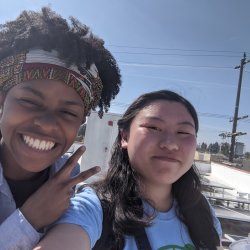Due to the COVID-19 pandemic, only a handful of student teams were able to travel to GRID offices for Solar Spring Break before in-person volunteer opportunities were put on hold. (Learn more about GRID’s response to COVID-19.) In early spring, Sammi Chan, GRID Workforce Development & Volunteer Fellow, traveled to Los Angeles to spend Solar Spring Break with participating students from Villanova University, before the shutdown took effect.
Although the term “underserved communities” is used as a catch-all for the communities on the frontlines of climate change, these communities are active partners in the fight for environmental justice and access to solar. This was especially evident during the time I spent with the Villanova University team, hosted by the GRID Greater Los Angeles office (GLA).
During the week, we met leaders from many of the communities GRID serves. On a solar PV installation in Compton and a scavenger hunt in Watts, we explored how gentrification and racial justice has affected and is currently affecting local communities. In Watts, community leaders spoke about police brutality, gun violence, and a lack of green spaces that many people take for granted.
A story that particularly stood out was about the lack of trees on the sidewalk - trees were cut down, so that people could not hide for a number of reasons including visibility for helicopters. The Watts Rising Collaborative, funded by a Transformative Climate Communities (TCC) grant, which GRID is a part of, has set forth a number of goals including the creation of cool spaces and an overall reduction in the amount of pollution in the environment. The TCC brings to light the intersection between how environmental pollution impacts racial justice.
Villanova students were especially engaged during the tour of Homeboy Industries, a non-profit social-enterprise that provides wraparound services for formerly gang-involved folx. They provide job training, legal services, mental health services, and even tattoo removal. The work of Homeboy industries represents how much work needs to go into helping the communities that we all serve and the complexity of issues that revolve around it.
Now that I am back home in the Bay Area, I am witnessing how the pandemic has magnified racial disparities in the communities that GRID works with. I have had the luxury of working from home, but these communities are more likely to have pre-existing conditions, less access to healthcare, and more likely to hold jobs that require physical contact such as nursing and other service industry jobs.
I’d also like to acknowledge the students who fundraised and prepared for their trips, but were unable to go. The program fee from Solar Spring Break trips continues to help communities access clean, renewable solar power. We hope that these students get another chance to engage with GRID and the communities that we work with and stay healthy through these difficult times.
Thanks to Wells Fargo for supporting Solar Spring Break.

